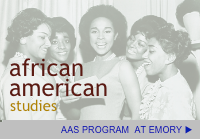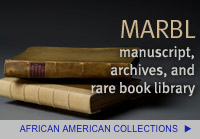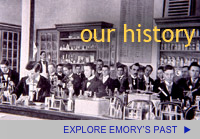The Few Society
About & Context
Emory University’s first years as a private liberal arts college was met with many challenges, new opportunities and successes. With many white males looking for formal education shortly after grade school, Emory provided the perfect setting in small town Oxford, Georgia. With all these young males at Emory, clubs and organizations started to be established around campus. Literary societies in particular were popular among the young men of the university. These literary societies offered a time and place to talk about current events and controversial issues without penalty from outsiders or society. The several literary societies founded on campus considered themselves a brotherhood. Each literary society had distinct characteristics to that group, and members of each group could be seen wearing their respective literary society’s colors and logo. The most popular and arguably the most documented literary society was the Few Society.
The Few Society was established in 1839 and named after the university’s first president, Ignatius Few. Members of Emory’s first literary society, Phi Gamma Society, “decided to divide and form two organizations to provide more frequent participation in speaking,” (Bullock, 117). This division of the original literary society subsequently created what is known back then and today as the Few Society. On August 10, 1839, the Few Society met for the first time and drafted a constitution outlining the society’s purpose and laws. That constitution stated that public speaking was the mission of the society, with obligations to meet weekly discussing events current to their time period. Within the constitution there were also several rules that were to be strictly followed by its members. Four affirmative speakers as well as four negative speakers were to be appointed by the society in order for debates and conversations to run smoothly. Another rule to keep meetings flowing includes a fine of 25 cents to any person that does not actively participate in the meetings. Speeches were also limited to 15 minutes per person. In many ways this literary society can be looked upon as an academic fraternity where brotherhood was widely expressed. The close knit, family like bonding along with the strict selection process for membership allows for many to consider these groups as fraternities.
Significance
Many readers of this topic might ask, “How does the Few Society pertain to African-American history?” or “What do white males of the 1830s and 1840s have to do with African-Americans?” However, to much surprise, the Few Society indirectly has affected African-American history at Emory University. The Few Society debated and discussed many controversial topics during their time in session. Several of the controversial topics the Few Society discussed include life in the American south and slavery. On October 17, 1840, the society was prompted with the question, “Will the establishment of Southern factories be promotive of the general good of the United States?”. This progressive, controversial question indicates many positives for the Few Society. For one, this question proves that the members were not afraid to discuss distinct societal differences between the North and South United States. During this time in history, the South occupied an agricultural based economy while the North was expanding into the industrial, factory controlled economy. These economic differences propelled differences in social norms such as tendencies in slavery. The American South depended on slavery in order to prosper as an economy.
Slavery was a big topic of discussion that was debated on at the Few Society meetings. Because most Emory students at the time were from the South, if not all from Georgia, scholars were able to lend a first hand account on what slavery is like. Many students owned slaves back home and some even chose to bring their slaves to campus in Emory’s early years. One of the best topics of discussions that exist in A Book of Minutes of the Few Society was recorded on August 20, 1845. The question asks, “Is slavery recognized by the law of God, and should it be tolerated by the laws of man?”. A similar question, “Is slavery morally wrong?” was asked on June 7, 1856. Both of these debate questions debated with “much spirit and animation,” as described in the recording journal. With tensions increasing between North and South prior to the Civil War, these questions about slavery increased. The fact that young, college educated white males of the mid 19th century are discussing the morality of slavery is very intriguing in itself. These debates are very progressive for the conservative landscape that surrounds the campus. On the June 7, 1856 debate the president of the time voted in the negative for slavery being morally wrong. Even though the president disagreed that slavery was morally wrong, the simple fact that these topics are being discussed was a step in the right direction for African-American history and human society. Questioning such a large institution like slavery in the South could have been looked down upon, but these members of the Few Society felt it would be a great topic of discussion.
The Civil War led to the closing of Emory for the duration of the war. However, after the war was over many soldiers came to Emory to get their education. The Few Society maintained a strong presence on campus until the early to mid 20th century. By 1932, “it finally became apparent that there was no real interest in the literary societies,” which led to the demise of these groups on campus (Bullock, 194). Even with the death of the literary societies in the 20th century, Few Society will forever have a significant place in both the African-American history and general history that exists at Emory. The Few Society offered an academic outlet for debating controversial topics like slavery. Even though the demographic led to similar decisions on topics of debate, the talk over controversial issues was a step in the right direction. Merely talking about slavery being morally right or wrong offers the opportunity to question social norms of the South. These questions and debate about what is right versus wrong then offer an opportunity to break the patterns of the institution of slavery. Lastly, the Few Society gives us a first hand account of students that attended Emory in its first years.
Further Reading
The Manuscripts Archives and Rare Book Library, located on the 10th floor of Emory’s Woodruff Library, contain great sources for furthering research on the Few Society as well as the other literary societies of Emory. The first book, A Book of Minutes of the Few Society, is a primary source that contains the hand written recordings of meetings between 1839 and 1879. Another reading that offers a second hand account of the Few Society as well as other literary societies is a book entitled, A History of Emory University by Henry Morton Bullock. The book gives an outline of the background and the purpose of the literary societies that existed on campus. It also provides summaries of some of the most important topics debated amongst the members of Few Society.
(Noting that the primary source, A Book of Minutes of the Few Society was used as a source to document the discussions that accompy the debate questions.)




